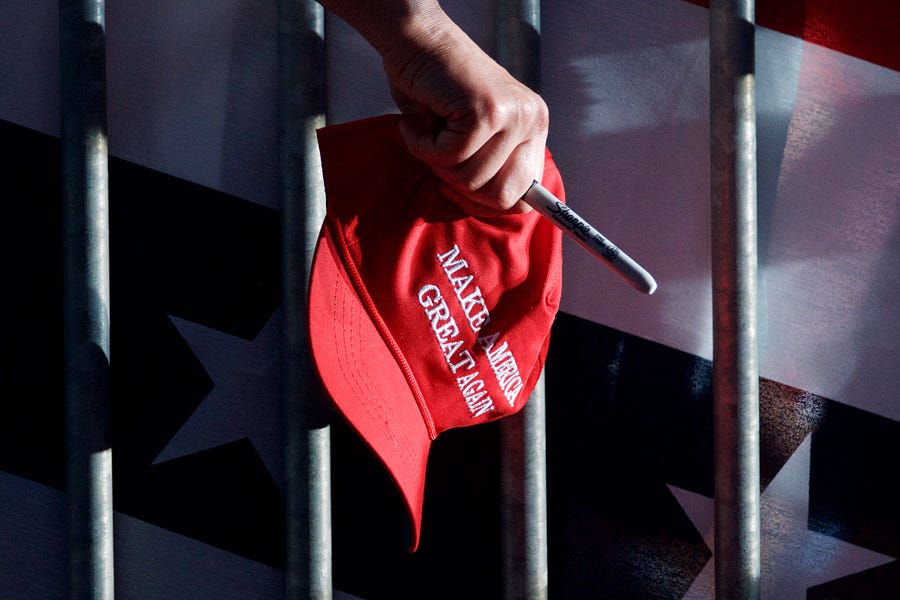For most Americans, conservatism basically means the stuff Republicans are for, and liberalism means whatever Democrats are for. I don’t mean this as a criticism, just a statement of fact.
One of the great things about America is that politics—never mind political philosophy—isn’t a big part of most people’s lives. Associating a body of ideas with the institutions (political parties) that are directly charged with putting ideas into action is a pragmatic way to cut to the chase. Paying attention to what the eggheads and theorists of the left and right want the parties to do is only worthwhile if you’re especially interested in politics.
The challenge for conservatives these days is that the Republican Party really doesn’t know what it’s for, beyond defending President Trump and opposing Democrats and socialism. While the fight over impeachment sucks up all of the oxygen in public, there’s a robust battle behind the scenes about what it means to be a conservative.
Some of it has spilled out into public view, usually centering on nationalism—what it means, what it requires in terms of policy, how it differs from traditional conservatism or whether it differs at all. Sens. Josh Hawley and Marco Rubio, for example, have offered thoughtful versions of “economic nationalism,” pitting it against libertarianism (both real and imagined).
There are many different schools of thought here, but a common theme is the idea that government should be more interventionist in the economy: Policymakers should be more willing to overrule the marketplace on everything from big tech to child care to trade.
Republicans were outraged by the way the Obama administration “picked winners and losers” in the economy. Some were appalled when Obama bailed out automakers with a massive handout. Trump has now given more aid to farmers than Obama ever gave Detroit, and if an elected Republican has complained about it, I missed it. In fairness, the farmer bailouts were necessitated by the president’s trade wars. But that just demonstrates Republicans’ willingness to substitute their judgment for the market’s.
There’s a cultural version of the nationalist project as well. Some conservative intellectuals—mostly, but not exclusively, Catholic—believe the state has a role in imposing its judgment in the marketplace of ideas.
I have strong views about all of this, but I thought it might be helpful to offer a few humble suggestions about how to think about such things as these debates heat up.
First, the root of conservatism is conservation. The great conservative philosopher Roger Scruton, who died earlier this month, said, “Conservatism starts from a sentiment that all mature people can readily share: the sentiment that good things are easily destroyed, but not easily created.” This sentiment is at the heart of traditional conservatism, but it’s not constrained by ideology or partisanship. Many liberals (and even some socialists) have displayed this temperament.
Second, with the great divide in conservative theory, there are those who are anti-left and those who are anti-state. For a crude illustration, some people are opposed to public schools because they don’t think education is a proper task for the state. (Milton Friedman called them “government schools.”) Others on the right think public schools are fine; they just object to how progressives operate them, filling kids’ heads with objectionable ideas.
Obviously, most libertarian purists are in the anti-state camp, but for most conservatives it’s a balancing act. A consistent conservative can be libertarian on nearly all policy questions and still favor heavily regulating or even banning pornography.
Another fault line revolves around the question, “Which state are we talking about?”
If I may show my cards a bit, outside of foreign policy, I’m very libertarian at the national level, mostly libertarian at the state level and pretty communitarian at the local level. Letting people live the way they want to live where they actually live, so long as basic civil rights are respected, has always struck me as the best way to maximize happiness and democratic accountability.
This raises a final question: Can the state actually do what you want it to do?
At the core of the conservative critique of the left has always been a basic skepticism that top-down planning from Washington can work. It used to be that the champions of such planning were mostly on the left. That’s not true any longer. And it remains to be seen whether top-down planning from the right works any better than it does from the left.
Photograph by Bastiaan Slabbers/NurPhoto via Getty Images.







Please note that we at The Dispatch hold ourselves, our work, and our commenters to a higher standard than other places on the internet. We welcome comments that foster genuine debate or discussion—including comments critical of us or our work—but responses that include ad hominem attacks on fellow Dispatch members or are intended to stoke fear and anger may be moderated.
With your membership, you only have the ability to comment on The Morning Dispatch articles. Consider upgrading to join the conversation everywhere.